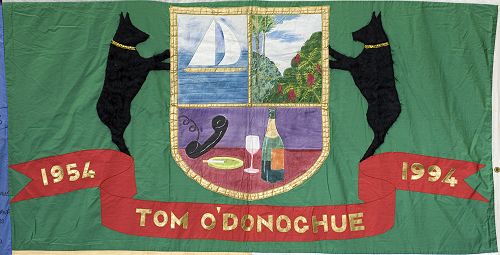
Whatever You Do to the Least
In this Year of Mercy, Trish McBride reflects on the life of Tom O'Donoghue, a man who lived mercy and love and left a legacy of hope.
God is Love, aroha. God was present in Tom O'Donoghue's dealings with people during his life and tangible at his funeral in Wellington on 1 October, 1994. Tom's death as a result of AIDS received national attention in the media. He had been committed to HIV/AIDS education in the six years following his diagnosis with HIV. He crusaded to prevent the spread of HIV/AIDS and to make life more bearable and whole for those with the virus.
I did not know him well but his courage in speaking out at the Candlelight Memorials made an impression on me. Tom was the first person I heard say publicly:
“I am a gay man and I am HIV positive.”
That was on Pentecost Sunday, 1991, in Parliament Grounds. That night the ring of flaming torches reminded me of the tongues of fire at the first Pentecost. I sensed that the Spirit of Love was again conquering fear, breaking down barriers, creating a community of acceptance and respect in the face of ostracism and fear from various sections of our society.
Tom spoke again at Beacons of Hope in 1992 and in 1993, when he said: “I now have AIDS”. On Pentecost Sunday 1994 he was still there despite being very ill. His message encouraged HIV positive people to disclose their status. He urged them to take this risk even though it would be very stressful to face the prejudice in society. But it was a healthier path for them than living under the burden of secrecy as well with the virus itself. Tom died in September 1994.
Tom's impact on people emerged through the stories at his funeral. A young man who has AIDS told how Tom had changed his life by encouraging disclosure. He said:
“Because of that I was able to find the courage to go and tell my mum. It was OK. She is supporting me now. I wish I had done it five years ago.”
Alexis, a member of the transgender community said:
“Tom saved my life. He stopped me from committing suicide. He taught me to look inside myself and throw away some rubbish and value the rest. Look at the people beside you and around you. When you see each other, when you see each other in town, let's say “Hi!’”
Katherine O'Regan, the Associate Minister of Health, told of the times Tom had been in her office, lobbying, persuading, being an advocate for the rights of people living with HIV/AIDS, for prisoners, prostitutes, drug users, transvestites and transexuals. She wept. Hers had been more than a bureaucratic encounter - she had felt the impact of Tom's humanity, knowledge and crusading spirit.
A speaker from the Justice Department responsible for the AIDS education and prevention programme in prisons, spoke of how Tom had taught her to respect and relate to people belonging to marginalised minorities.
And there were the lighter moments. A old friend described Tom as a man who enjoyed a good time, a "party vulture". Then added, peering at the bronze bird of the lectern: “Speaking of vultures...”
Catherine, from the Prostitutes Collective, remembered Tom's gift for bringing groups who had had little contact with each other, to a place of mutual respect and cooperation together.
Fellow workers from the People Living with AIDS Union, of which he was a founding member, committed themselves to carrying on his work and at to keep his memory alive as a "Beacon of Hope" for then and the future.
So there we were, gays, lesbians and straight, public servants, prostitutes, trans-gender people, intravenous drug users, people living with HIV and AIDS, nuns, ex-prisoners, family, co-workers, friends - united in love and respect for this remarkable man. Someone said that Tom was not religious but he was deeply spiritual and had a particular affinity for the Buddhist way.
I think of Tom's life and work in Christian imagery and language:
I was hungry and you gave me food; I was thirsty and you gave me drink; I was a stranger and you made me welcome, naked and you clothed me, sick and you visited me, in prison and you visited me" (Matt 25: 35-40).
And He has sent me to bring the good news to the poor, to proclaim liberty to captives and to the blind new sight, to set the downtrodden free (Luke 4:18).
Tom lived and worked among some of the most stigmatised and marginalised people in our society. He fed them with love and hope and quenched their thirst with his compassion.
When they felt isolated and marginalised by the virus he drew them into the community of care and mutual support he had been instrumental in forming. He clothed them and taught them to clothe themselves and each other with the garment of respect.
He was an empowerer, an enabler who opened people’s eyes to their own human value through the way he interacted with them. He showed them how to live honestly, courageously, freer from fear and fought for their rights as human beings. They called him “Teacher” and "Rangatira".
Tom's was a Christ-like life. He packed much into his last six years - from his HIV positive diagnosis until his death. He is missed and remembered. His spirit and example continues to enrich and inspire those who know that their time is limited by the virus.
And he has given me and others cause to ponder about labels, judgements and condemnations and about how instead to practise the mercy of Jesus.
**********************************************************
The Quilt Panel (below) in the New Zealand AIDS Memorial Quilt was made by Tom's friends Mark Thompson and David L. Brown.
The green background acknowledges Tom's Irish ancestry.
The two Schipperke dogs represent Wallis and Jojo who loyally accompanied Tom as his coffin was finally carried down the 110 steep steps and winding path of his house on 1st October 1994. They are fabricated from a black mohair scarf of Tom's.
The native plants, including Kaka Beak are to do with Tom's interest in growing New Zealand native plants.
The yacht is a reference to Tom's love of sailing, which began during his childhood in Paihia and continued with his trans-Atlantic crewing adventures.
The cigarette, telephone and glass of wine are a reference to Tom's habit of long, chatty conversations in his Wadestown (Wellington) kitchen, with a cigarette burning and a glass of wine in his hand.
Gallery

